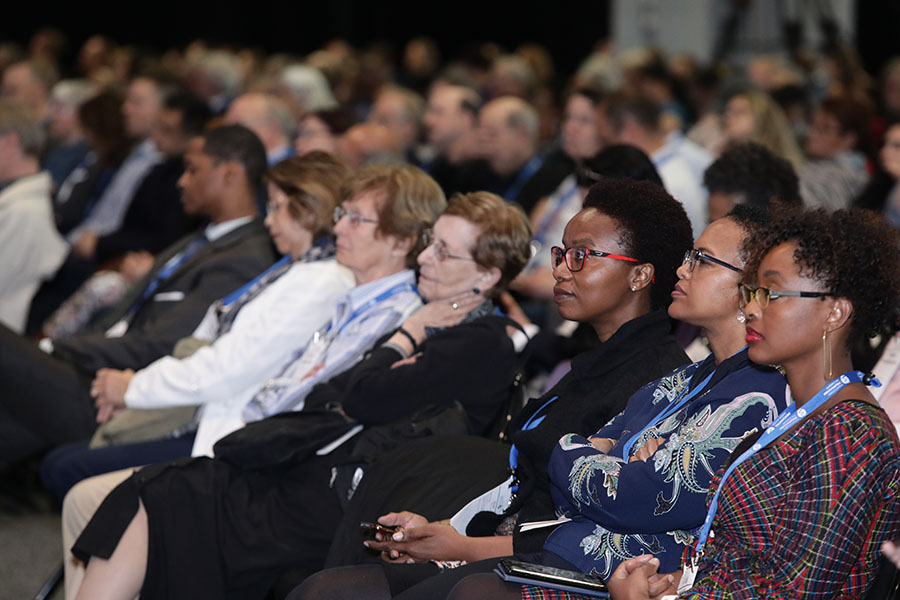Diversity & Health Equity Focused Sessions at the 2023 Mental Health Services Conference

By Veronica Handunge, M.P.H.
Kara Dixon, APA’s new Director of the Office of Scientific Programs, gave us an exclusive look at the 2023 Mental Health Services Conference, hosted October 12-14 in Washington, D.C.
For members who’ve never attended – what is the Mental Health Services Conference?
The Mental Health Services Conference is a multidisciplinary event bringing together a wide audience of mental health service providers to the nation’s capital, from all over the country. Presenters include psychiatrists, psychologists, social workers, nurses, judges and law enforcement, and patients themselves, all in one dynamic setting.
What is the significance of this conference?
I think it’s important to bring together a diverse array of mental health professionals and those engaged in this field more broadly to collaborate on practical advice and influence systems-level change for their patients. I don’t want people to view it as a “mini Annual Meeting.” It’s more community-based; it reaches more topics in the community-based psychiatry field which is integral to health equity. It also provides a unique networking opportunity, a chance to build genuine connections, highlight collaborative efforts, and highlight tangible change in the mental health landscape.
What can we expect from the conference related to diversity & health equity?
For attendees with a keen interest in diversity and health equity, the conference will tackle pressing issues such as the Black youth mental health crisis and the impact of psychiatry in segregated institutions on today’s practice. Other topics include informed consent models in gender affirming care and strategies for partnering with faith-based leaders to increase access to mental healthcare.
Anything else attendees should know?
The 2023 Mental Health Services Conference has some new features. This year, there will be several poster sessions. There's also a new session type called the Ignite Sessions, designed for maximum impact in 60-minutes to drive practice change. On Thursday, there’s a poster competition for medical students. And on the final day, attendees should look forward to the leadership track.
Diversity & Health Equity Focused Sessions
- Applying Informed Consent Models to Gender Affirming Care - Presenters will provide an overview of the informed consent model and its application when working with trans and gender diverse people.
- It’s a Matter of Faith: How to Build Bridges to Care Between Faith Communities and Mental Health Providers - This session will outline the need to form partnerships between faith leaders and mental health providers, and how by working together, we can build better bridges to care for both congregations and faith leaders.
- The Crisis within the Black Youth Mental Health Crisis: A Multi-faceted Problem Requiring a Multi-Pronged Solution - This interactive presentation will provide an overview of research reflecting existing mental health inequities impacting Black youth, explore the mental health implications of marginalization and discuss effective advocacy strategies for engaging with entities outside of traditional medical practice to meet the growing and unmet needs of youth.
- The Asylum in the Archive: An Interactive Exploration of Race and Psychiatry in the Turn of the Century South - This session will examine the clinical records created between 1856 and 1923 by social workers, psychiatrists, and asylum superintendents at two segregated institutions in connect the formation of psychiatry in the nineteenth and early twentieth centuries with the work of clinicians today.
- Broaching Racial, Ethnic, and Cultural Differences in Supportive Psychotherapy - This workshop will focus on the importance of broaching skills in psychotherapy, providing training on how to broach issues of race, gender identity, and culture in the context of supportive psychotherapy.
- Frequent ED Utilization: A Whole City Approach to Addressing Social Vulnerability in the 911 System - City Attorneys from the City of San Diego present alongside the San Diego Fire-Rescue Department Behavioral Health Officer to describe their collaboration with Fire, EMS, and Law Enforcement to ensure better outcomes and accountability for vulnerable people.
- Equitable and Inclusive Early Psychosis Services: Considering Ethnoracial Marginalized Identities and Culture - The goal of this session is to provide insights from panelists’ experiences as clinicians and researchers to inform how EPS can be accessible, useful, attractive, and meaningful for marginalized groups.
Diversity & Health Equity Focused Posters
- Its a Start: An Online, on-Demand LGBTQ+ Mental Health Training Is a Beneficial Primer for Providers Nationwide
- Suicide Risk in the Assigned Female at Birth Transgender Men Population: A Retrospective Analysis of Patients in an LGBTQ+ Mental Health Clinic
- Disparities in Mental Health Service Utilization Among Filipinx Americans in Inland Southern California and Recommended Interventions
- Suicidality and Trends in Native American/Alaskan Native and Multiple Race Youths and Comparison With Non-Hispanic White
- Racial/Ethnic Differences in Physical Restraint and Parenteral Medication Use Among Patients Presenting to the Emergency Department for Psychosis
- Addressing Racial Disparities in Recruitment and Retention of Black Psychiatric Residents: Insights From a Roundtable Discussion and Action Plan
- Designing a Culturally Sensitive Trauma Informed Care Certification for South Texas From a Community Model Approach
